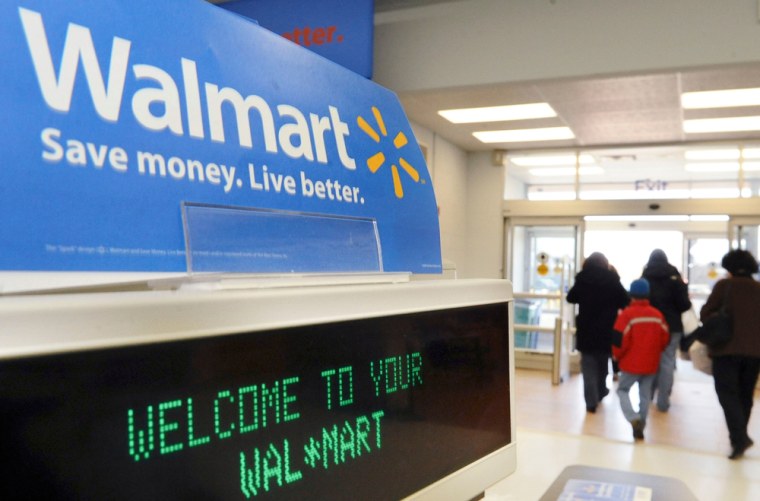Wal-Mart is the latest in a line of traditionally Republican-leaning businesses to embrace key portions of President Barack Obama’s bid to overhaul health care, a trend that could complicate opponents’ efforts to build a united front when Congress ramps up its work on the issue this summer.
Wal-Mart, the nation’s largest private employer, on Tuesday endorsed the idea of requiring large companies to offer health insurance to their workers. The proposal is central to Obama’s hopes of covering the nation’s nearly 50 million uninsured and is disliked by some business groups.
Wal-Mart was joined by a major labor union that sometimes has criticized the company’s relatively stingy employee benefits.
The big retailer is not the only one-time opponent of health care revisions to embrace at least some aspects of Obama’s proposals. The major group representing pharmaceutical makers recently said it would reduce senior citizens’ costs for prescription drugs by $80 billion over 10 years. And major groups representing doctors, hospitals and other providers have pledged to reduce health care costs by large amounts.
Nearly all these groups, by varying degrees, opposed efforts to overhaul the nation’s health care system during the Clinton administration in 1993-94. Moreover, Wal-Mart and its officials have given far more in political contributions over the past decade to Republicans than to Democrats. The same is true of the pharmaceutical industry and several other health-related groups.
But with better prospects for a health care bill this time — and the public favoring overhaul, many businesses and industries want to be part of the final legislation rather than left out.
“We are for an employer mandate which is fair and broad in its coverage,” Wal-Mart said in a letter to congressional and administration officials. “Any alternative to an employer mandate should not create barriers to hiring entry-level employees.”
That was a reference to some proposals in Congress to have employers pay the Medicaid costs of new hires. Critics say that would discourage the hiring of low-income people.
The letter was also signed by Andrew L. Stern, president of the Service Employees International Union, which has more than a million members and counts more U.S. health workers than any other union. Also signing it was John Podesta, who headed Obama’s transition team and is president of the Center for American Progress.
As recently as 2006, Wal-Mart fiercely fought Maryland’s efforts to force it to contribute more toward its employees’ health care coverage.
The Wal-Mart and SEIU letter could build momentum on two fronts: Wal-Mart’s bid to improve its image regarding worker treatment, and Obama’s health care agenda.
In recent years, SEIU and other unions or liberal groups have criticized Wal-Mart for charging relatively high premiums to its employees for health insurance, and forcing them to wait up to two years for coverage.
Last May, the Federal Election Commission dismissed a complaint by labor groups that accused Wal-Mart Stores Inc. of pressuring employees to vote against Democrats in November’s election, though FEC staffers warned the case was a “close call.”
Wal-Mart lately has tried to improve employee relations, and has hired some prominent Democrats to broaden its political base. One of them, executive vice president Leslie Dach, said Wal-Mart feels the current U.S. health care system is unsustainable, and an employer insurance mandate is a cost that businesses should accept.
SEIU’s Stern praised Wal-Mart and said: “Everyone, including employers, must share responsibility in guaranteeing every working American quality, affordable insurance.”
Nancy-Ann DeParle, director of the White House Office of Health Reform, said the Wal-Mart and SEIU move was significant as Congress prepares to debate competing health plans this month. “The rising cost of health care is hurting employers and employees alike,” she said, “restricting businesses’ ability to grow and keeping workers’ wages flat.”
Obama will hold a town-hall forum on health care Wednesday in Virginia. On Tuesday, he phoned Sen. Olympia Snowe of Maine, a moderate Republican whom Democrats hope to draw into a bipartisan fold on health care.
Tuesday’s letter suggested that Wal-Mart’s and SEIU’s enthusiasm for an employer mandate might wane if the final legislation does not also include a mechanism to ensure cuts in the cost of delivering health care.
“Support for a mandate also requires the strongest possible commitment to rein in health care costs,” it said.
Former Senate Democratic Leader Thomas Daschle and others have proposed a federal commission with powers to impose Medicare cost reductions, among other things, if overall health delivery costs do not reach certain targets in a given time. The letter endorsed Daschle’s efforts.
